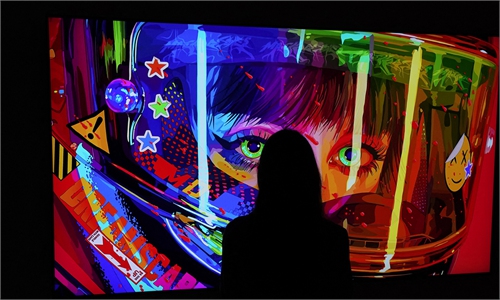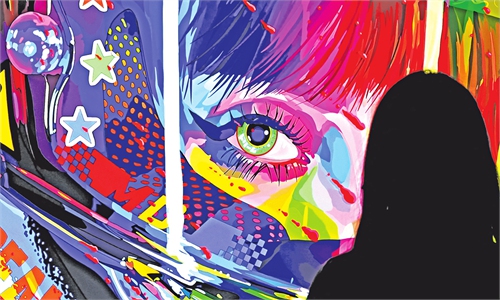
An NFT titled SHIFT/ by Mad Dog Jones is on display during a press preview in New York City. Photo: AFP
The blockchain-based, digital asset industry involving non-fungible tokens (NFT) has grown rapidly this year in China, with domestic leading players such as Alibaba and Tencent betting big on the niche sector.
That's despite a relatively late start compared with Western peers, in particular US tech companies that have taken the lead.
Since Chinese regulators stepped up their crackdown against cryptocurrency trading and mining, many industry players have become very cautious about compliance, drawing a line between the legitimate application of blockchain technology on the one hand and crypto-tokens on the other.
"Discussions around NFTs are extensive not only in the blockchain industry this year, but also in venture capital and tech circles. Artists are rushing to develop digital works of art, hot money is flowing in, and we're seeing explosive growth," an industry insider, who spoke on condition of anonymity, told the Global Times on Wednesday.
The months of regulatory pressure on cryptocurrency participants also fueled the fanfare surrounding NFTs, the insider said.
An NFT is a digital asset that exists on blockchain. Unlike most digital items, which can be endlessly reproduced, these are uniquely identifiable digital items that can be authenticated through blockchain.
The NFT fever is being further fanned with the entry of Chinese big-name companies. Tencent in early August launched an NFT trading platform called Huanhe. The platform has sold two batches of audio and artwork NFTs to date, all of which were sold in less than one second after becoming available to public.
In June, Alipay launched in China 8,000 limited-edition NFTs based on two pieces of artwork to commemorate ancient artwork from the Dunhuang Caves. The cave is home to some of the finest examples of Buddhist art spanning a period of 1,000 years. These items were also quickly sold.
Industry observers said that Chinese companies are relative latecomers in the NFT industry because of the lack of a top-down ecosystem, from independent studios that develop digital art to NFT exchanges and potential buyers.
But Chinese firms' edges in widening applications and accumulated blockchain technologies could help them close gaps with foreign rivals, they noted.
New York-based OpenSea is now the world's largest digital marketplace for NFTs and collectibles. The volume of its transaction, which is based on multiple public blockchains, eclipses that of the just-launched Huanhe, which is based on Tencent's self-developed Zhi Xin chain.
Also, unlike most NFTs that could be openly traded, the NFTs bought on Alibaba and Tencent's platforms are for only collectors and investors, and are not open to secondary transactions.
"Such curbs are aimed at preventing speculation and complying with regulatory requirements. Chinese firms shall always prioritize compliance issues," the anonymous insider said. But he noted that Chinese regulators could take a more moderate attitude on NFT development, as such transactions - if they don't use cryptocurrencies as payment and aren't based upon public blockchains - don't create financial risks or involve illegal practices such as money laundering.
In June, AntChain highlighted the distinction between NFTs and cryptocurrencies, after public doubts mounted over the legitimacy of its NFT issues in China.
"NFTs are essentially different from virtual currency equivalent tokens. They're supported by the actual value of digital goods, and they don't have any currency attributes such as payment functions," the company said.
Qin Qing, the blockchain product director of Tencent Cloud, told the media that NFTs issued through consortium blockchains are clearly not currencies, and they thus could be issued legally.


